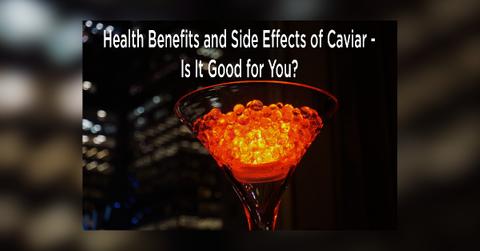 NEWS
NEWSHealth Benefits and Side Effects of Caviar — Is It Good for You?

June 8 2022, Updated 1:00 p.m. ET
What Is Caviar?
Caviar and roe are usually confused; however, caviar refers only to eggs of various species of sturgeon fish, such as Osetra, Beluga, and Sevruga. Roe is a popular and less expensive alternative to caviar. You can visit the caviar vs. roe page to see the main differences in nutrition and health impact.
Health Benefits
Caviar is a good source of vitamins, minerals, and healthy fatty acids. You can read more about caviar’s nutrition in our Caviar Nutrition & Calories article.
Cardiovascular Health
According to research, omega-3 fatty acids may help balance blood pressure and lower the risk of developing heart disease. Furthermore, these organic acids may reduce heart rate and blood vessel tightness to lower blood pressure and triglyceride levels and increase HDL (good) cholesterol levels [1].
Brain Health
Omega-3 fatty acids have several additional benefits for your brain, including the ability to fight inflammation. Omega-3 fatty acids are essential for learning and memory because the brain uses them to build brain and nerve cells. It has been hypothesized that reducing inflammation in the brain can slow the mental health decline seen in Alzheimer's disease [2].
Mental Health
Omega-3 fatty acids may be effective in the depressed phase of bipolar disorder. According to research, people who suffer from depression have lower omega-3 fatty acids, implying that a lack of this nutrient may be a risk factor for depression. Other psychiatric conditions, such as schizophrenia, borderline personality disorder, obsessive-compulsive disorder, and attention deficit disorder, have been linked to omega-3 fatty acids. However, more research is needed [3].
Skin and Eye Health
According to research, consuming omega-3 fatty acids, whether in foods or as a supplement, may help reduce macular degeneration and glaucoma. Omega-3 fatty acids may help prevent and treat various eye diseases, including dry eye syndrome. Not only can omega-3 fatty acids help reduce your risk of developing dry eyes, but they may also help treat bothersome symptoms, according to research.
According to one study, people who consume the most omega-3 fatty acids in their diet are 30% less likely to develop macular degeneration than their peers. Omega-3 fatty acids may also help reduce developing high eye pressure, leading to glaucoma.
Adipocytes may be stimulated by caviar extract, according to the study. Adiponectin is a molecule that improves wound healing in your skin, and anti-inflammatory processes promote collagen synthesis and prevent collagen fiber breakdown. Because collagen is essential for skin structure, researchers believe that extracting it may reduce the signs of skin aging [4] [5].
Want OK! each day? Sign up here!
Boost Immune System
In particular, it contains omega-3 fatty acids, vitamins, and minerals, which are essential for your body. Caviar contains omega-3 fatty acids and selenium, which may help your immune system. Omega-3 fatty acids reduce inflammation and restore the barrier function of your skin, intestines, and lungs, which aids in the blocking of harmful bacteria and keeps you healthy. Furthermore, caviar contains a high concentration of selenium and magnesium, both of which have antioxidant properties and may aid in lowering oxidative stress levels in the body, reducing inflammation, and enhancing immunity. Furthermore, caviar is high in zinc and iron, which help the immune and circulatory systems and may aid in the repair of damaged white blood cells, which are immune cells that protect you from the disease [6].
Weight Loss and Diets
It isn’t common to consume caviar while on weight-loss diets, however, due to its rich nutritional profile, it might be a good choice in the case of low-carb diets. Caviar is keto-friendly food since it is low in carbs and high in healthy fats [7].
Both black and red caviars are an excellent addition to the DASH Diet, Atkins Diet, Paleo Diet, and Dukan Diet.
Downsides And Risks
Allergy
Fish allergy is one of the most common food allergies, accounting for 1% of the population in the United States.
A person who is allergic to fish may also be allergic to caviar.
When a person with a fish allergy is exposed to that fish, proteins in the fish bind to specific IgE antibodies produced by the person's immune system, triggering the person's immune defenses and resulting in reaction symptoms that can be mild or severe [8].
Poisoning by Edible Fish
Ichthyosarcotoxism refers to a group of conditions caused by fish caviar or roe poisoning. Symptoms that appear soon after consuming the roe include abdominal pain, vomiting, diarrhea, headache, thirst, chest constriction, and low blood pressure. Several clinical syndromes with gastrointestinal, neurotoxic, and cardiotoxic features have been described [9].
REFERENCES
- https://www.ncbi.nlm.nih.gov/pmc/articles/PMC3712371/
- https://www.ncbi.nlm.nih.gov/pmc/articles/PMC7468918/
- https://www.ncbi.nlm.nih.gov/pmc/articles/PMC6713969/
- https://www.ncbi.nlm.nih.gov/pmc/articles/PMC7230711/
- https://www.ncbi.nlm.nih.gov/pmc/articles/PMC7246982/
- https://www.ncbi.nlm.nih.gov/pmc/articles/PMC6834330/
- https://www.ncbi.nlm.nih.gov/pmc/articles/PMC3945587/
- https://pubmed.ncbi.nlm.nih.gov/27613460/
- Ichthyosarcotoxism: poisoning by edible fish


